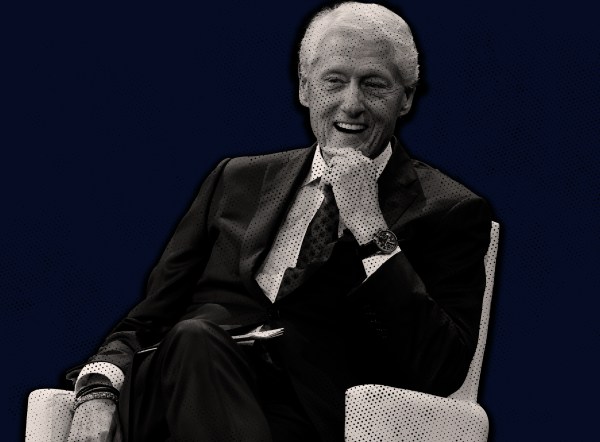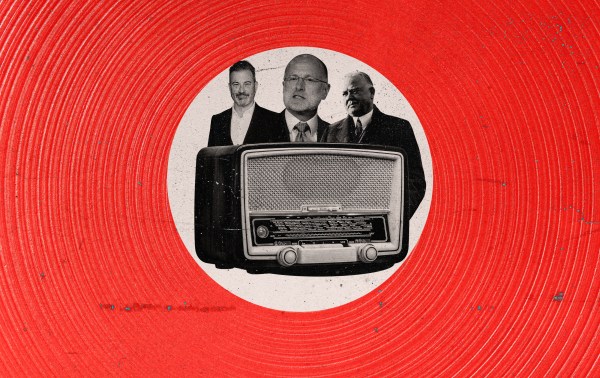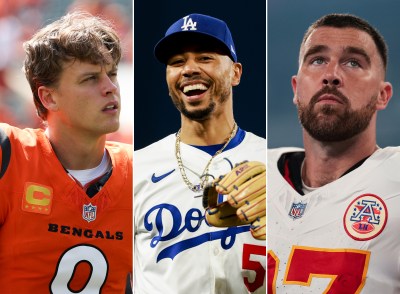A trend has emerged on Facebook in recent months: Accounts, often fan pages for professional sports teams or leagues, share feel-good stories of athletes performing unheralded acts of community service or philanthropy.
For example, the account “Dodgers Faithful” this week shared a story about star Mookie Betts finding a newborn abandoned on the side of the road while driving home from an event, calling 911, and accompanying the infant to the hospital. According to the story, the child is now grown, and he reunited with Betts at a Dodgers game in August.
Multiple pages have shared stories about Travis Kelce, the Kansas City Chiefs tight end and fiancé of Taylor Swift, donating funds to keep a pet shelter from going out of business. Others claim that Cincinnati Bengals quarterback Joe Burrow donated his entire signing bonus to charity.
While these stories are heartwarming, and each of the above athletes has established a charitable foundation, these specific claims—and many others like them—are false.
The Betts story, for example, includes details that are easily disprovable. The Facebook post claims, “In 2007, while driving home late at night from a veterans' charity event in rural Tennessee, MLB star Mookie Betts came across an image he would never forget — a newborn baby, abandoned by the roadside, wrapped in a worn baseball jacket, shivering under the freezing rain.”
Betts was just 15 years old in 2007, and did not make his Major League Baseball debut until 2014. The post links to an article that claims Betts and the young man were reunited at a game at Dodger Stadium on August 12, 2025. However, the Dodgers played the Los Angeles Angels in Anaheim that night, not at Dodger Stadium.
The accounts of Kelce saving a pet shelter follow a similar format, but also include some other telltale signs of misinformation: There are multiple versions of the same story, but with differing details: One claims he donated $120,000 to keep open the Paws of Hope shelter in Kansas City. Another claims he spent $750,000 to save North Pet Rescue. Internet searches show no results for Kansas City pet shelters named Paws of Hope or North Pet Rescue.
Similarly, different posts claim Joe Burrow donated his “entire signing bonus” to Cincinnati Children’s Hospital, a homeless shelter initiative, or other causes. The claims cite different totals for Burrow’s signing bonus: either $12.9 billion or $44.5 million. Burrow signed a contract extension in 2023 that included a $40 million signing bonus. The website for Burrow’s foundation identifies its mission as “hunger relief and focus on youth mental health.” The site touts donations “totaling over $2 million” for a variety of organizations in Ohio, Louisiana, and Kentucky.”
These claims have several things in common that readers can be on the lookout for: They are shared by unofficial and unverified fan pages or Facebook groups, and they link to articles not published by established, well-known media outlets. Instead, the links go to unusual or obscure URLs. For instance, the Mookie Betts post leads to https://flash.feji.io/, which displays an “N” icon for news but never reveals the name of the outlet. The story of Kelce saving the “Paws of Hope” pet shelter was published at a site with the URL gamenood.com that is labeled “Local News” without indicating any particular locality.
Pieces like this also tend to use overly sentimental language to catch readers’ attention. One post about Kelce reads: “Travis Kelce spent $120,000 to save an abandoned dog shelter — but what he did with the 48 dogs melted America’s heart.” (According to the post, Kelce paid off the shelter’s debts, personally delivered each of its 48 dogs to new families, and even adopted a three-legged dog that no one else wanted.)
Finally, fake Facebook stories like these often rely on AI-generated images. The viral post about Travis Kelce allegedly spending $120,000 to save an abandoned dog shelter included a photo of Kelce with several dogs. When analyzed with Hive Moderation, the image was flagged as likely to contain AI-generated or deepfake content. The Facebook post about Betts includes three photos of him embracing the young men he purportedly saved, and the teen is wearing different clothing in each photo.
Hany Farid, a professor at the University of California-Berkeley who studies misinformation and image analysis, reviewed the images from the Travis Kelce posts and the Mookie Betts story at the request of The Dispatch Fact Check—and found “strong evidence that these images are AI-generated.”
Farid also warned that, “detecting AI-generated or manipulated images is becoming increasingly more difficult. The best advice I can offer is to be suspicious of content you see on Facebook/Instagram and social media in general. These platforms have become polluted with so much AI slop to the point where they simply cannot be trusted.”
If you have a claim you would like to see us fact check, please send us an email at factcheck@thedispatch.com. If you would like to suggest a correction to this piece or any other Dispatch article, please email corrections@thedispatch.com.






Please note that we at The Dispatch hold ourselves, our work, and our commenters to a higher standard than other places on the internet. We welcome comments that foster genuine debate or discussion—including comments critical of us or our work—but responses that include ad hominem attacks on fellow Dispatch members or are intended to stoke fear and anger may be moderated.
With your membership, you only have the ability to comment on The Morning Dispatch articles. Consider upgrading to join the conversation everywhere.